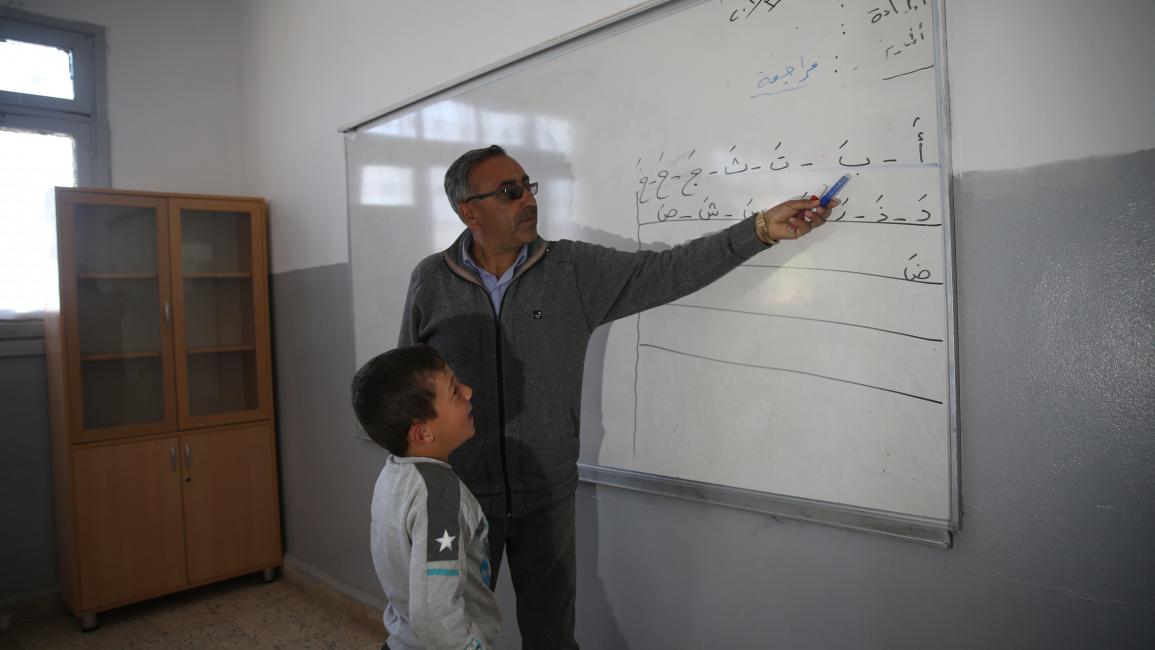Teachers in northwestern Syria, under the control of two opposition factions, face numerous challenges that complicate their roles in education. Chief among these is insufficient income, which barely meets the basic needs of their families amidst the region’s difficult living conditions.
In addition to low salaries, teachers contend with threats from lawlessness and the targeting of schools, putting their lives at constant risk. Despite these dangers, they remain committed to their students throughout the school year, striving to provide a quality education.
The dire financial situation is forcing many educators to seek additional work. Khader al-Ahmad, a teacher in the northern countryside of Aleppo, explained to Al-Araby al-Jadeed that some educators take jobs in private schools alongside their public school positions. Salaries in private institutions range from $100 to $200, depending on the number of classes and subjects taught, while public school teachers earn only $70.
Ahmad emphasized that these earnings are inadequate for basic living expenses, stating, “A teacher’s salary is not enough to rent a house or provide water and bread. Every teacher needs $500 a month for a decent life, which is unattainable.”
Omar Layla, a member of the Free Syrian Teachers’ Syndicate, noted that the lack of income drives teachers to seek additional employment in private schools or other sectors, with some even contemplating leaving the profession entirely.
The syndicate has previously issued warnings about the deteriorating state of education, highlighting the neglect of the sector that has led to a decline in public education and a rise in private schools. This situation has negatively impacted families, many of whom cannot afford private tuition while public schools suffer from a lack of resources.
Omar explained that Turkish oversight of education in northern Syria limits support from civil society organizations, hindering efforts to provide adequate salaries for teachers. He pointed out that the minimum required for a teacher to live decently is between $350 and $400, yet most earn barely a quarter of that—approximately 2,800 Turkish liras ($82), which places them below the hunger line. This economic strain forces many to abandon their teaching careers in search of better-paying opportunities.
Omar estimated that there are around 12,000 teachers in the Euphrates Shield and Olive Branch areas, similar to those in Idlib and western Aleppo, where conditions are similarly dire. The low salaries of 2,800 Turkish liras ($82) have led some educators to resign, further undermining the educational process and increasing dropout rates among students. In Azaz, for instance, several teachers have resigned after protesting their challenging working conditions.
Northern Syrian Schools: Overcoming the bitterness of ignorance under any pressure
Khaled Abdel Hai, a teacher living in the Afrin and displaced from an area of northern Homs, is seriously considering leaving education due to his inability to meet his family’s needs. “I trained as a lawyer, and I may return to that profession because the income from teaching is insufficient to support my four children,” he told Al-Araby al-Jadeed. “I’m currently searching for another job to leave education permanently; things have become unbearable, and I need solutions that better address my urgent living requirements.”
Teacher Mohieddin al-Hamdan echoed this sentiment, noting that “teachers in northwestern Syria are forced to seek additional employment, as salaries rarely exceed $150 per month, which is inadequate for basic living costs. For instance, a ton of firewood costs around $170, and with winter approaching, our salaries barely cover food expenses. I rely on support from relatives outside Syria, which helps me get by; otherwise, I would be in a very difficult situation.”
The education sector is also grappling with a shortage of qualified staff, compounded by the displacement of teachers and ongoing instability. This crisis negatively impacts the quality of education and contributes to rising dropout rates and decreased student enrollment in schools.
This article was translated and edited by The Syrian Observer. The Syrian Observer has not verified the content of this story. Responsibility for the information and views set out in this article lies entirely with the author.


